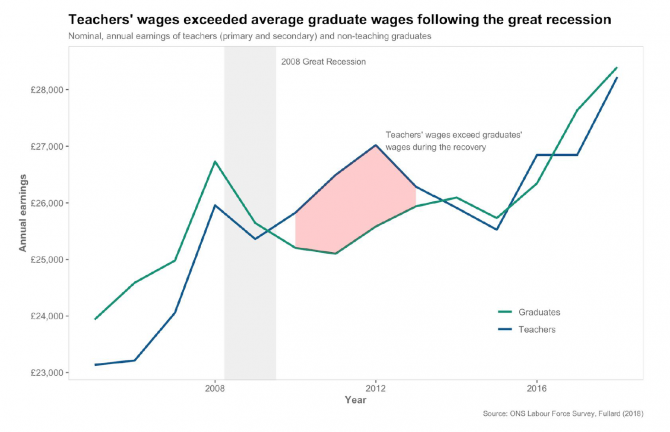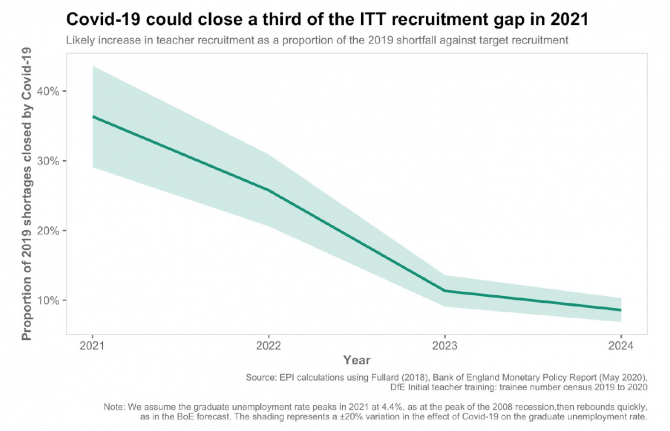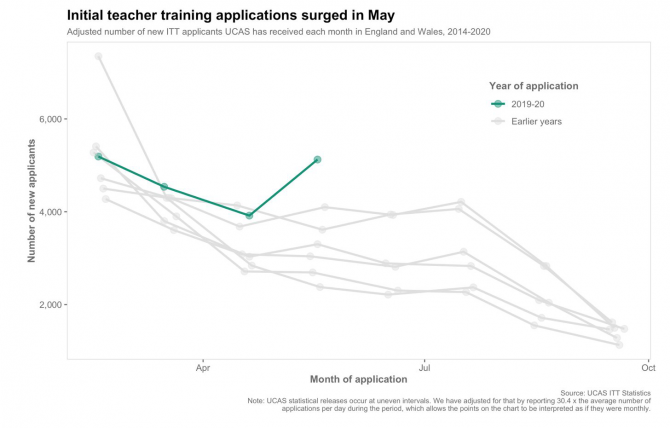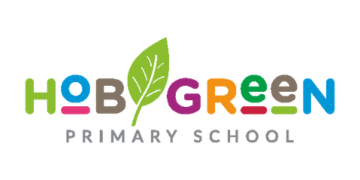The coronavirus-induced recession could reduce teacher recruitment shortages by up to 40 per cent, a new analysis has suggested.
The Education Policy Institute predicts around 1,800 more graduates will go into teacher training programmes over the next two years (see graphs below).
The boost in numbers during the predicted coronavirus recession is down to jobs drying up and wages falling, meaning the “job security and stable wages” of teachers become more attractive to graduates.
EPI’s calculations are based on the covid-19 recession affecting graduates in a similar way to the recession following the 2008 financial crash.
The government has missed it secondary teacher recruitment targets for seven years running. EPI said the shortfall has been around 3,000 teachers in recent years.
However Schools Week revealed earlier this month how schools are pulling out of offering teacher training placements, saying they don’t want extra people in the classroom and are reluctant to let trainees teach because pupils have already missed so much learning.
Just this week, teacher training charity Teach First dropped 120 recruits from this year’s cohort because it said schools had halted recruitment.
The EPI study also states retention is likely to be boosted during any recession.
A recent survey by SchoolDash found 14 per cent of respondents said they had second thoughts about changing jobs because of coronavirus.
As more than 36,000 classroom teachers leave each year, EPI pointed out even a “modest effect” on attrition (eg five per cent) would have a “large effect on the number of teachers in the school workforce” (1,800 more teachers remaining in the classroom).
The report stated: “The inevitable recession caused by Covid-19 is likely to increase teacher numbers and ease recruitment and retention challenges.”
Any boost in teachers would help schools deal with the impact of a secondary school bulge which is expected to see pupil numbers rise by up to 10 per cent over the next few years.
While UCAS data for May shows the highest initial teacher training applications since 2014, EPI believes the “main increase in enrolment to start in the 2020-21 round”.
“Following the 2008 recession, ITT enrolment did not peak until the 2009/10 application round, which started roughly 13 months after the recession struck.”
Writing for Schools Week last month, teacher workforce expert Jack Worth said while covid-19 may have an “unexpected silver lining for teacher supply” there are also “potential risks the sector needs to remain vigilant to”.
Worth, school workforce lead at the National Foundation for Educational Research, added: “Ensuring teachers’ workload is manageable during school closures and as schools begin to reopen, and safeguarding their safety, health and well-being, is key to supporting current teachers through the crisis.”
EPI also warned teachers drawn into the profession during a recession are “more likely to quit when other opportunities become available again”. This is based on a study in Florida looking at the impact of recession on teacher effectiveness.
The think tank suggests government introduce retention incentives of £2,000 per year to existing early career teachers in shortage subjects to make sure any covid-19 boost in teacher numbers are retained in future years.










It’s not a recruitment and retention problem. It’s a funding problem. There are plenty of excellent, experienced teachers out there. But schools don’t want to pay for them!